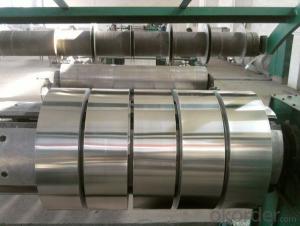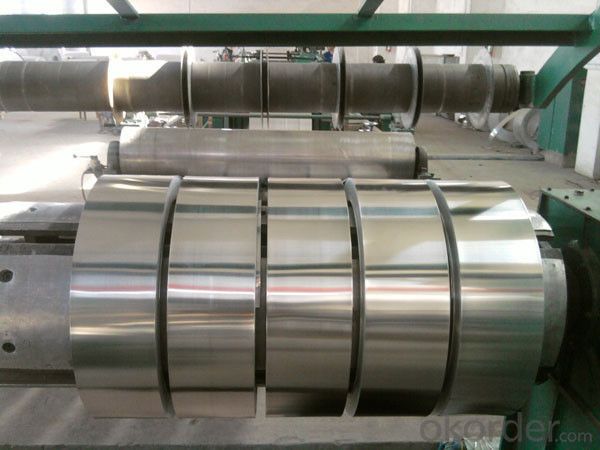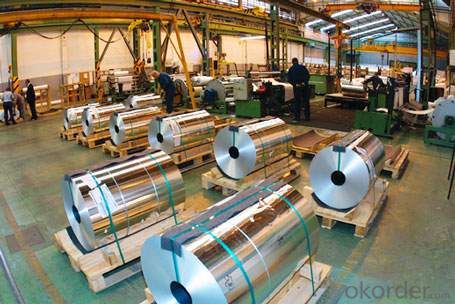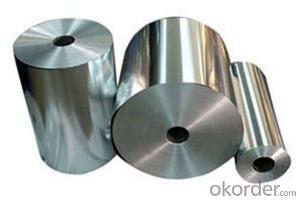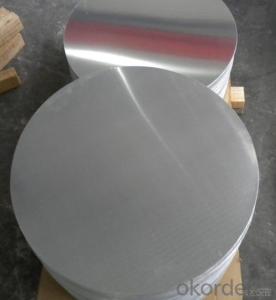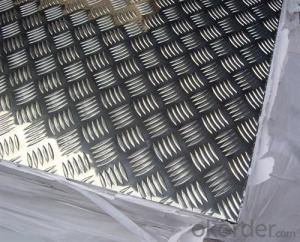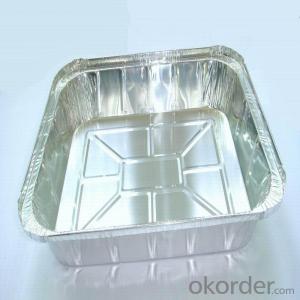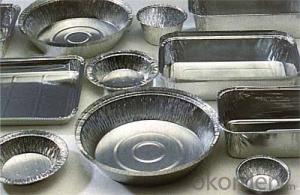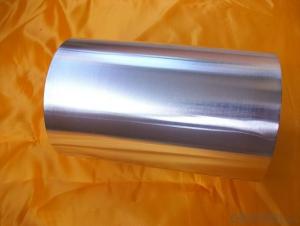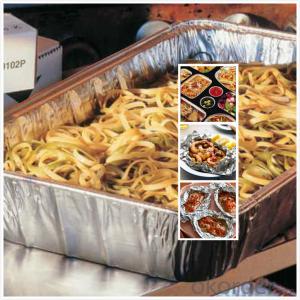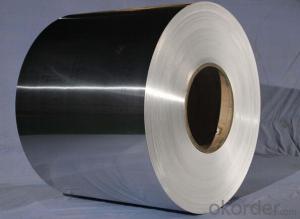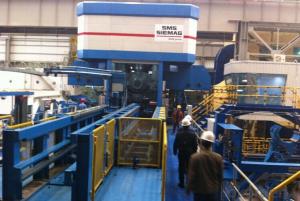Aluminum Coil Stock - Household Aluminum Foil Food Grade Aluminium Roll for Kitchen
- Loading Port:
- Shanghai
- Payment Terms:
- TT OR LC
- Min Order Qty:
- 3 m.t.
- Supply Capability:
- 6000 m.t./month
OKorder Service Pledge
OKorder Financial Service
You Might Also Like
Specification
Household Aluminum Foil Food Grade Aluminium Roll for Kitchen
Packaging & Delivery
Name | 3003 Aluminum Coil |
ALloy or Not | Yes |
Alloy | 1100H-18, 3003-H24,3003-H26,3005-H26,8011,3004,3105,5005,etc. |
Thickness | 0.1~1.5mm |
Width | <2000mm< span=""> |
MOQ | 1 MT |
Coating finish | Brushed, drawing, embossed, printing |
Color | As to code RAL |
Surface | Embossed,Mill Finish,Coated,Brushed |
Gloss | 10-90%(EN ISO-2813:1994) |
Total coating thick | PVDF27 ~35micron |
Polyester18~27micron(EN ISO-2360:1995) | |
Coating hardness | 2H |
Adhesion | 5B (EN ISO-2409:1994) |
Impact resistance | No cracking and peeling (A.S.T.M D2794-1993) |
Flexibility (T-bend) | 0T- 2T |
MEK resistance | 100 |
Certification | ISO9001:2000, CE, SGS |
Coil's standard diameter | 1100mm |
Inner Diameter | 405mm/505mm |
Coil's standard weight | 1MT - 2MT |
Product Specification | |
Grade | 1000 Series: 1050 1060 1100 3000 Series: 3003 3004 3105 5000 Series: 5052 5605,5083 6000 Series: 6061 6063 8000 Series: 8011 8021 8079 |
Thickness | 0.20-8.00mm |
Width | 2400mm max. |
Grade | 1000,3000,5000,6000,8000series |
Coil ID | 75mm, 150mm, 200mm, 300mm, 400mm, 508mm or negotiable |
Coil weight | 1000-5000kgs |
Coil OD | 1700mm max. |
Temper | O, H12, H14, H16, H111, H22 ,H24, H26, H28,T4, T6,etc. |
Chemical Composition | |||||||||
| Grade | Si | Fe | Cu | Mn | Mg | Cr | Ni | Zn | Al |
| 1050 | 0.25 | 0.4 | 0.05 | 0.05 | 0.05 | - | - | 0.05 | 99.5 |
| 1060 | 0.25 | 0.35 | 0.05 | 0.03 | 0.03 | - | - | 0.05 | 99.6 |
| 1070 | 0.2 | 0.25 | 0.04 | 0.03 | 0.03 | - | - | 0.04 | 99.7 |
| 1100 | Si+Fe:0.95 | 0.05-0.2 | 0.05 | - | - | 0.1 | - | 99 | |
| 1200 | Si+Fe:1.00 | 0.05 | 0.05 | - | - | 0.1 | 0.05 | 99 | |
| 1235 | Si+Fe:0.65 | 0.05 | 0.05 | 0.05 | - | 0.1 | 0.06 | 99.35 | |
| 3003 | 0.6 | 0.7 | 0.05-0.2 | 1.0-1.5 | - | - | - | 0.1 | remains |
| 3004 | 0.3 | 0.7 | 0.25 | 1.0-1.5 | 0.8-1.3 | - | - | 0.25 | remains |
| 3005 | 0.6 | 0.7 | 0.25 | 1.0-1.5 | 0.20-0.6 | 0.1 | - | 0.25 | remains |
| 3105 | 0.6 | 0.7 | 0.3 | 0.30-0.8 | 0.20-0.8 | 0.2 | - | 0.4 | remains |
| 3A21 | 0.6 | 0.7 | 0.2 | 1.0-1.6 | 0.05 | - | - | 0.1 | remains |
| 5005 | 0.3 | 0.7 | 0.2 | 0.2 | 0.50-1.1 | 0.1 | - | 0.25 | remains |
| 5052 | 0.25 | 0.4 | 0.1 | 0.1 | 2.2-2.8 | 0.15-0.35 | - | 0.1 | remains |
| 5083 | 0.4 | 0.4 | 0.1 | 0.40-1.0 | 4.0-4.9 | 0.05-0.25 | - | 0.25 | remains |
| 5154 | 0.25 | 0.4 | 0.1 | 0.1 | 3.1-3.9 | 0.15-0.35 | - | 0.2 | remains |
| 5182 | 0.2 | 0.35 | 0.15 | 0.20-0.50 | 4.0-5.0 | 0.1 | - | 0.25 | remains |
| 5251 | 0.4 | 0.5 | 0.15 | 0.1-0.5 | 1.7-2.4 | 0.15 | - | 0.15 | remains |
| 5754 | 0.4 | 0.4 | 0.1 | 0.5 | 2.6-3.6 | 0.3 | - | 0.2 | remains |
| 6061 | 0.40-0.8 | 0.7 | 0.15-0.40 | 0.15 | 0.8-1.2 | 0.04-0.35 | - | 0.25 | remains |
| 6063 | 0.20-0.6 | 0.35 | 0.1 | 0.1 | 0.45-0.9 | 0.1 | - | 0.1 | remains |
| 6082 | 0.7-1.3 | 0.5 | 0.1 | 0.40-1.0 | 0.6-1.2 | 0.25 | - | 0.2 | remains |
| 6A02 | 0.50-1.2 | 0.5 | 0.20-0.6 | Or Cr0.15-0.35 | 0.45-0.9 | - | - | 0.2 | remains |
| 8011 | 0.50-0.9 | 0.6-1.0 | 0.1 | 0.2 | 0.05 | 0.05 | - | 0.1 | remains |
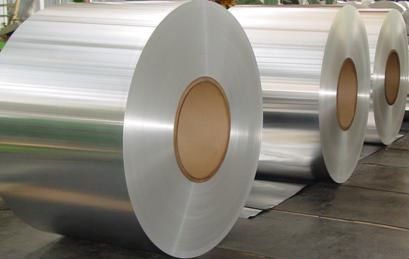
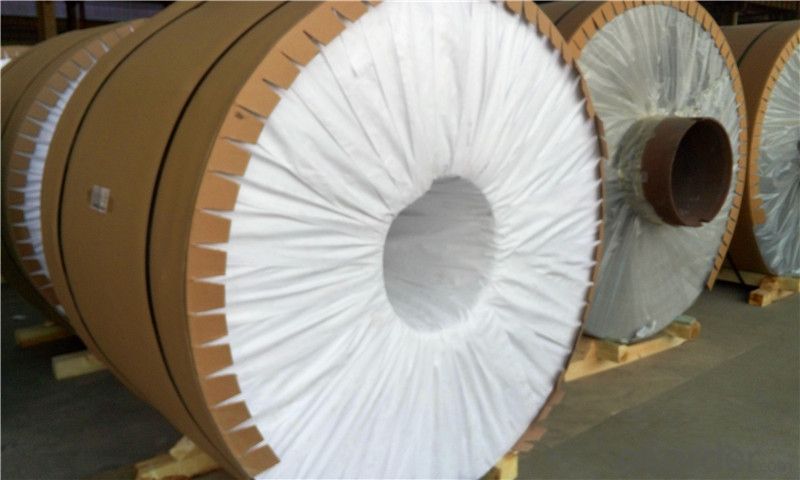
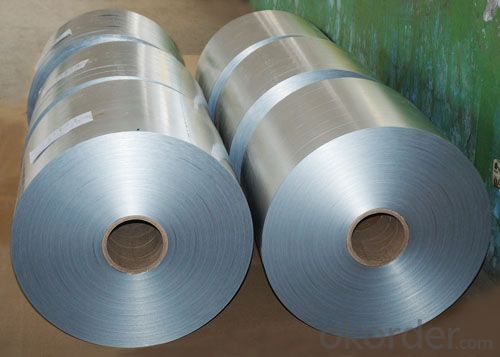
- Q: How long do aluminum coils typically last?
- The typical lifespan of aluminum coils is approximately 15 to 20 years, but their longevity is heavily influenced by various factors including the quality of the aluminum, the installation process, and the maintenance and care given to them. The lifespan of the coils can be significantly prolonged by regularly maintaining them, such as by cleaning the coils and ensuring adequate airflow. Moreover, their durability can also be affected by environmental factors like exposure to severe weather conditions and corrosive substances. Hence, ensuring proper care and maintenance is crucial to guarantee the extended lifespan of aluminum coils.
- Q: Explain the distinctions among various welding equipment used specifically for joining aluminum coils.
- <p>Different types of welding equipment for aluminum coils include Gas Tungsten Arc Welding (GTAW), Gas Metal Arc Welding (GMAW), and Resistance Welding (RW). GTAW, also known as TIG welding, uses a non-consumable tungsten electrode and produces high-quality welds with minimal distortion. GMAW, or MIG welding, uses a continuous wire feed as the electrode and is faster but may not be as precise. Resistance Welding involves using electrical current to heat the metals at the joint, which is quick and efficient but not suitable for all aluminum alloys. Each method has its advantages and is chosen based on factors like weld quality, speed, and the specific aluminum alloy being welded.</p>
- Q: What are the common alloys used in aluminum coil production?
- The common alloys used in aluminum coil production are 3003, 3105, 5052, and 6061.
- Q: What are the acoustic properties of buildings using aluminum coils?
- The acoustic properties of buildings using aluminum coils can be influenced by various factors. Aluminum coils are commonly used in the construction industry for roofing, cladding, and insulation purposes. From an acoustic perspective, these properties can have both positive and negative impacts on the sound transmission within a building. One of the primary acoustic benefits of using aluminum coils is their ability to act as a reflective barrier for sound waves. When properly installed, aluminum coils can help prevent sound from penetrating through walls or ceilings, resulting in a reduction in external noise sources. This can be particularly beneficial in areas with high levels of noise pollution, such as urban environments or near busy roads. Additionally, aluminum coils can contribute to the overall sound insulation of a building. Due to their material properties, they can provide a certain level of soundproofing, especially when combined with other insulation materials. This can help maintain a comfortable and quiet indoor environment, allowing for improved concentration, productivity, and overall well-being of occupants. However, it is important to note that the acoustic properties of buildings using aluminum coils can also have limitations. Aluminum is a lightweight material compared to alternatives like concrete or brick, which means it may not provide as much mass to block sound transmission. Therefore, in situations where high sound insulation is required, additional measures such as double glazing, acoustic seals, or thicker wall constructions may be necessary. Furthermore, the use of aluminum coils can also affect the sound reverberation within a space. Due to their smooth and reflective surface, aluminum coils can potentially cause sound waves to bounce off, leading to increased echo and reverberation time. This can negatively impact speech intelligibility and acoustic comfort, especially in larger open-plan areas or rooms with high ceilings. Overall, while aluminum coils can offer certain acoustic advantages such as sound reflection and insulation, it is important to consider the specific requirements of each building project. Consulting with acoustic engineers or professionals can help ensure that the appropriate measures are taken to optimize the acoustic properties of buildings using aluminum coils, and to address any potential limitations.
- Q: Can aluminum coils be used in the production of electrical enclosures?
- Absolutely! Electrical enclosures can indeed be manufactured using aluminum coils. When it comes to producing these enclosures, aluminum is highly favored due to its exceptional conductivity, lightweight properties, and ability to resist corrosion. By utilizing aluminum coils, we are able to create enclosures that are both seamless and robust, guaranteeing efficient dissipation of heat and providing optimal protection for electrical components. Moreover, the versatility of aluminum coils allows for easy molding and shaping into a wide range of forms and sizes, offering great flexibility in design. In conclusion, incorporating aluminum coils into the production process of electrical enclosures not only ensures reliability but also proves to be a cost-effective solution.
- Q: Can aluminum coils be used in the production of sporting goods?
- Sporting goods production can involve the use of aluminum coils, a lightweight and durable material commonly found in the manufacturing of baseball bats, tennis rackets, golf clubs, and bicycles. These coils are often employed as a raw material during the production process, helping to shape and structure the final sporting goods. The utilization of aluminum in sporting goods provides several benefits, including improved performance, increased durability, and enhanced weight distribution. Furthermore, aluminum's resistance to corrosion makes it an excellent choice for outdoor sporting activities. Ultimately, the versatility, strength, and performance-enhancing capabilities of aluminum coils contribute to their widespread use in the production of sporting goods.
- Q: What are the potential health hazards of working with aluminum coils?
- Several potential health hazards can arise from working with aluminum coils. One primary concern involves the exposure to aluminum dust or fumes. When aluminum is cut, shaped, or welded, it releases fine particles or fumes that can be inhaled. Prolonged exposure to aluminum dust can irritate the respiratory system, leading to coughing, wheezing, and shortness of breath. In some cases, it can even result in lung damage or respiratory disorders like asthma. Another health hazard related to aluminum coils is the possibility of skin contact with aluminum salts or compounds. Various forms of aluminum salts, such as aluminum hydroxide or aluminum chloride, can cause skin irritation, rashes, and even dermatitis, particularly in individuals with sensitivities to them. Additionally, aluminum coils might be coated with different substances, including lubricants or coatings, which may contain potentially harmful chemicals. These chemicals can penetrate the skin or be released as fumes when the coils are heated or processed. Exposure to these chemicals can result in skin irritation, allergies, or even more severe health effects if they are toxic or carcinogenic. Furthermore, aluminum production and processing involve the use of various chemicals and materials that can pose additional health risks. For example, during the manufacturing process, aluminum coils may undergo cleaning or treatment with acids, alkalis, or solvents. These chemicals can be hazardous if not handled properly, and workers may be at risk of chemical burns, respiratory irritation, or other acute health effects. To address these health hazards, it is crucial to implement appropriate safety measures. Employers should provide adequate personal protective equipment (PPE), such as respirators, gloves, and protective clothing, to minimize exposure to aluminum dust, fumes, and chemicals. Regular ventilation and air monitoring should also be in place to ensure a safe working environment. Additionally, all workers should receive training programs on the safe handling and disposal of aluminum coils and related materials to minimize the risk of accidents or injuries.
- Q: How are aluminum coils tested for surface adhesion?
- To ensure the quality and performance of aluminum coils, various methods are employed to test their surface adhesion. Among these methods is the tape test, where a piece of adhesive tape is firmly applied to the coil's surface and swiftly removed. The amount of coating or paint that comes off with the tape is then evaluated to gauge the adhesion. If excessive coating is removed, it indicates poor surface adhesion. Another approach involves the use of a cross-cut or knife test, whereby a grid pattern is carved into the coil's surface using a sharp blade. The grid is subsequently covered with adhesive tape and swiftly removed. The adhesion is assessed by examining the extent to which the coating or paint is removed from the cut lines. If there is minimal or no removal of the coating, it suggests good surface adhesion. Moreover, the pull-off adhesion test is frequently conducted using specialized equipment. This test entails affixing a device to the coil's surface and applying gradually increasing force until the coating or paint begins to detach. The force required to cause detachment is measured, providing a quantitative measure of the surface adhesion strength. In summary, these testing methods play a crucial role in enabling manufacturers to evaluate the surface adhesion of aluminum coils and ensure compliance with the necessary standards in various industries, such as automotive, aerospace, and construction.
- Q: What is the flexural strength of aluminum coils?
- The flexural strength of aluminum coils varies depending on the specific grade and thickness of the aluminum used. Generally, aluminum coils have good flexural strength due to the inherent properties of aluminum, which is known for its high strength-to-weight ratio.
- Q: Are aluminum coils suitable for beverage can manufacturing?
- Aluminum coils are indeed appropriate for the production of beverage cans. Aluminum is the favored material for this purpose because of its numerous beneficial characteristics. To begin with, aluminum is lightweight, enabling easy transportation and handling. This is especially crucial in the beverage industry, where a substantial number of cans are manufactured and distributed. Furthermore, aluminum possesses high malleability, allowing it to be shaped into the desired form without compromising its structural integrity. This quality makes it perfect for the manufacturing of cans, as it can be effortlessly molded into the cylindrical shape required and withstand the pressure exerted by carbonated beverages. Moreover, aluminum is non-toxic, ensuring that it does not contaminate the beverages stored within the cans. It also acts as a protective barrier against light, oxygen, and moisture, effectively preserving the flavor and quality of the beverages. Additionally, aluminum is recyclable, thus making it an environmentally friendly option for can production. The recycling process for aluminum consumes significantly less energy than the production of new aluminum, rendering it a sustainable material choice. In summary, the appropriateness of aluminum coils for beverage can manufacturing is evident due to their lightweight nature, malleability, non-toxicity, preservation properties, and recyclability.
Send your message to us
Aluminum Coil Stock - Household Aluminum Foil Food Grade Aluminium Roll for Kitchen
- Loading Port:
- Shanghai
- Payment Terms:
- TT OR LC
- Min Order Qty:
- 3 m.t.
- Supply Capability:
- 6000 m.t./month
OKorder Service Pledge
OKorder Financial Service
Similar products
Hot products
Hot Searches
Related keywords
